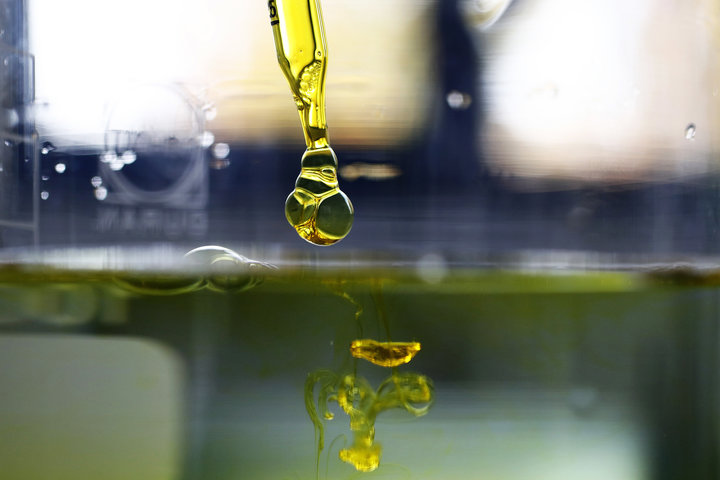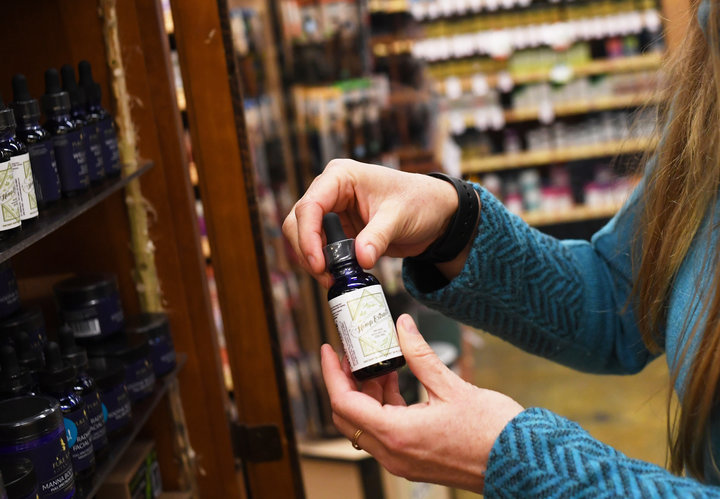[ad_1]
For a product aimed to mellow people out, CBD sure is inspiring a lot of excitement.
CBD, or cannabidol, is one of the non-psychoactive components found in the cannabis or hemp plant. That means it doesn’t get a user high, unlike marijuana. The ingredient has seen a surge in popularity, with people using it as a tool for a host of health issues.
CBD is available in oils, which is arguably its most widely known and often-studied form. (It can also be used in a vape pen, consumed through food like CBD gummies or added to items like creams and beauty products.) All sounds pretty magical, right?
Like with most health-related items, you should understand the benefits and limitations of CBD before you rush off and start using products like CBD oil. Below is a breakdown of just some of the things you should know, according to research and experts:
CBD oil may help with mental health issues.
Perhaps one of the most popular uses for the product is to gain relief from stress or other mental health issues ― and for a good reason. CBD’s effects may be similar to anti-anxiety medication or antidepressants, Virginia Thornley, a board-certified neurologist in Sarasota, Florida, who reviews scientific articles on cannabidiol, previously told HuffPost.
Research also shows some promise: A study published in 2017 by São Paulo University in Brazil found that CBD was able to decrease anxiety in patients with social phobia. A review published in the journal Schizophrenia Bulletin suggests CBD may also produce clinical benefits for patients with early psychosis.
CBD oil might help people living with addiction.
CBD could be a promising treatment method for people living with addiction, according to Yasmin Hurd, a neuroscientist and director of the Addiction Institute at the Mount Sinai School of Medicine.
Hurd and her colleagues conducted clinical CBD studies in animals and in humans to see how it may help with drug addiction. The research yielded positive results in both clinical trials.
“When we looked at CBD … it decreased heroin-seeking behaviors,” Hurd said. They’re now conducting other studies with other people around the world to further test CBD’s efficacy when it comes to treating addiction.
“There’s no miracle drug,” Hurd said. “But this could be helpful for at least some aspects of craving.”

Some evidence suggests it could help with pain and other medical conditions.
A 2016 study looking at rats with arthritis found that CBD gel applied to rats’ joints reduced inflammation and overall pain in the rats’ affected joints. This suggests that using CBD could be beneficial for pain relief for people with the same condition. However, more research needs to be done to see if the same effect can be replicated in humans.
Many users of CBD say that the products alleviate pain and side effects from medical conditions, and experts are also finding preliminary evidence where that could be the case. This includes possible relief from epilepsy seizures, cancer treatment pain and chronic pain. But again, more research is needed.
CBD oil could help with sleep.
CBD can create a feeling of sleepiness, Hurd said. Tiredness also could be considered a side effect of the product (but more on that below).
According to Michael Breus, a clinical psychologist and board-certified sleep specialist, CBD’s ability to calm stress and anxiety may also be beneficial for getting those Zs. As he pointed out in a piece on HuffPost in 2017, studies are also finding CBD can help with disorders that prevent people from getting proper rest:
CBD has the ability to reduce anxiety, which can be helpful in reducing sleep difficulties and improving sleep quality. CBD may increase overall sleep amounts, and improve insomnia, according to research. CBD has been shown to reduce insomnia in people who suffer from chronic pain.
Of course, all of this is well and good, but people should still take caution, Hurd warned. Here are some limitations with CBD that consumers should stay aware of:
There are dosage issues.
CBD products aren’t approved items from the U.S. Food and Drug Administration. This means they aren’t regulated for purity and dosage like other medications.
“Any medicinal product, you have to be able to reproduce or know what the patient will get every time they take it,” Hurd said. “When someone is taking Asprin from a bottle, they’re not going to wonder, ‘Is this tablet going to give me twice the amount I need?’”
Using oils is the best way to get the right amount out of any CBD product because the user can better control what’s consumed, Hurd said.
There are some possible side effects of CBD oil.
Some people may experience sleepiness using CBD, but as Hurd explained, the product might also be used to help with sleep issues. Hurd said people also reported having diarrhea after using a high concentration, but that hasn’t been validated in every study. It may also cause irritability or nausea. The American Academy of Pediatrics also warns against its use in children because of concerns about brain development.
For the most part, CBD “has not been shown to have a lot of side effects,” Hurd said, which is why researchers are hoping to study it more as a potential treatment option for health conditions. “The potential benefits to the side effects are pretty low,” she said.
It might still be considered illegal in some states.
Although the law is often confusing for users and up for interpretation, CBD may still be considered as an illegal substance in some areas of the U.S. Cannabis, where both marijuana and CBD can be derived from, is also considered a Schedule 1 drug, which means there is “no currently accepted medical use and a high potential for abuse,” according to the Drug Enforcement Administration.

Ultimately, more research needs to be done on CBD oil.
CBD sounds like a miraculous product in theory, but experts ― including Hurd ― stress that more data needs to be collected before any definitive conclusions can be made. And because of cannabis’ Schedule 1 classification, support for clinical research on the possible positive effects of using marijuana and CBD is difficult.
“Strong data is lacking with CBD. There have been only small research trials, some showing benefit, others showing no benefit with CBD,” Pritham Raj, an internist-psychiatrist in Portland, Oregon, previously told HuffPost. So essentially the jury is still out, Raj said.
Ultimately, “CBD has potential medicinal value,” Hurd said, but caution is key right now. Purchasing CBD from a dispensary or on the internet, even where it’s legal, still comes with some limitations in terms of treating a health issue.
“I still think there should be caution and people should be vigilant about the CBD they might be taking because not enough research has been done,” she continued. “And that’s what we’re trying to do. We’re working to conduct a lot of clinical trials to be able to give more insight into how people can utilize CBD more effectively for their particular disorder.”
[ad_2]
Source link

